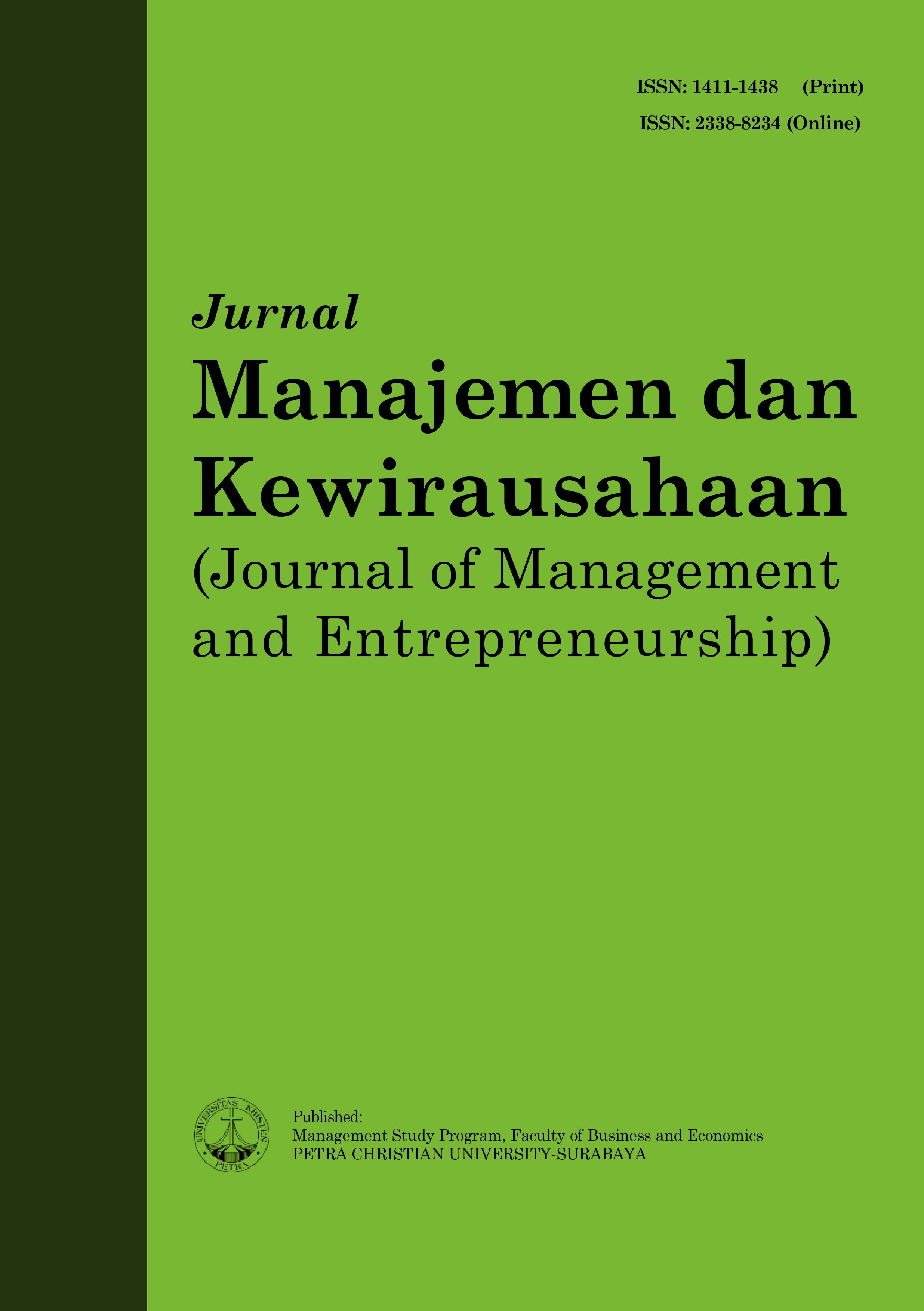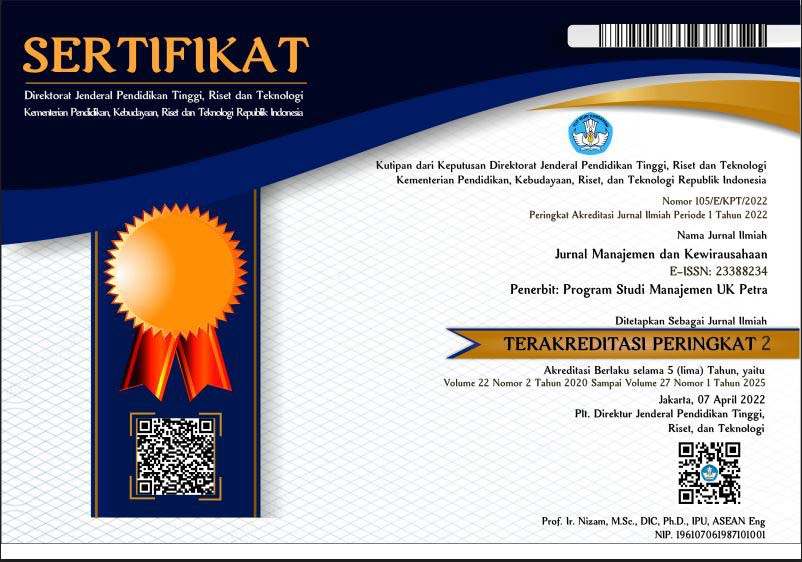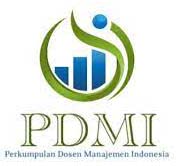THE ADVANTAGES OF THE MICRO EQUITY MODEL FOR MSME BUSINESS RESILIENCE IN YOGYAKARTA DURING PANDEMIC
 :
:
https://doi.org/10.9744/jmk.23.2.167-176
Keywords:
Micro loan, micro equity, micro-enterprise resilientAbstract
Many MSME business enterprises were severely hit during the Covid-19 pandemic. This study examined a micro equity financing model as an innovative answer to conventional loans in assisting MSME to survive during and after the pandemic. The micro equity financing model employed a profit-sharing system with flexible repayment and without collateral. A qualitative, descriptive data processing approach was employed. Interviews were conducted online with respondents of MSME that use the micro equity model in the Trust Network Finance (TNF) project in Yogyakarta. It was found more than 75% of MSMEs in Yogyakarta had experienced contractions on the marketing of their business. And more than 50% of MSME players in Yogyakarta had experienced problems in repaying loans due to the Covid-19 pandemic crisis. We suggested from the results that the micro equity model had shown to provide many benefits to MSME, especially in marketing and financial aspects, such as more accessible loan applications, flexible repayment schedules, and business assistance.
References
Ansari, N (2014). Promoting microenterprises through microfinance: Opportunities beyond microcredit. Master thesis, HTW Berlin University, Berlin.
Atmadja, A. S., Su, J. J., & Sharma, P. (2015) Examining the impact of microfinance on microenterprise performance (Implications for women-owned enterprises in Indonesia). International Journal of Social Economics, 43(10), 962–981. https://doi.org/10.1108/IJSE-08-2014-0158
Azhari, A. R., & Wahyudi, R. (2020). Analisis kinerja perbankan syariah di Indonesia: Studi masa pandemi Covid-19. Jurnal Ekonomi Syariah Indonesia, X(2), 67–83. https://doi.org/10.21927/ jesi. 2020.10(2).96 - 102
Bradley, S. W., McMullen, J. S., Arts, K., & Simiyu, E. M. (2012) Capital is not enough: Innovation in developing countries, Journal of Management Studies, 49(4), 684–717. https://doi.org/10.1111/j.1467-6486.2012.01043.x
De Mel, S., McKenzie, D. J., & Woodruff, C. M. (2019). Micro-equity for microenterprises. Policy Research. Retrieved from https://documents.wor ldbank.org/en/publication/documents-reports/do cumentdetail/647381554128100263/micro-equi ty-for-microenterprises
El-Zoghbi, M., & Tarazi, M. (2013). Trends in sharia-compliant financial inclusion. CGAP Focus Note, 84, 1–11.
Etemad, H. (2020). Managing uncertain consequences of a global crisis: SMEs encountering adversities, losses, and new opportunities. Journal of International Entrepreneurship. 18, 125–144. https://link.springer.com/article/10.1007/s10843- 020-00279-z
Hadi, S., & Supardi. (2020). Revitalization strategy for small and medium enterprises after corona virus disease pandemic (Covid-19) in Yogyakarta. Journal of Xi’an University of Architecture & Technology, 12(4), 4068–4076. https://doi.org/1 0.37896/JXAT12.04/1149
Lu, Y., Wu, J., Peng, J., & Lu, L. (2020). The perceived impact of the Covid-19 epidemic: Evidence from a sample of 4807 SMEs in Sichuan Province, China. Environmental Hazards, 19(4), 323–340. https://doi.org/10.1080/17477891.2020.1763902
Malik, K., Meki, M., Morduch, J., Ogden, T., Quinn, S., & Said, F. (2020). COVID-19 and the future of microfinance: Evidence and insights from Pa-kistan. Oxford Review of Economic Policy, graa-014. https://doi.org/10.1093/oxrep/graa014
Meki, M., Quinn., S., & Toth, R. (2018). Beyond mi-crocredit: Early evidence on micro equity for the poor in Indonesia. Retrieved from https://skoll centreblog.org/article/beyond-microcredit-early-evidence-on-microequity-for-the-poor-in-indon esia#/
Merkel, A. L. (2013). Risk, trust, and contract choice: evidence from a microfinance product in Indonesia. Master thesis, Ludwig-Maximilans-University, Munchen.
Nugroho, Y., & Negara, S. D. (2020, Oct). COVID-19’s impact on micro, small & medium enterprises and tourism in Indonesia. PERSPECTIVE: ISEAS – Yusof Ishak Institute, 124, 1–11.
Parker, S. C. (2009) The economics of entrepreneurship. New York, NY: Cambridge University Press.
Prameka, A. S., Sudarmiatin, Wiraguna, R. T., Prabowo, S. H. W., & Do, B. R. (2021). A new strategic business expectancy for MSME sustainability: The impact of uncertainty during the CO¬VID-19 pandemic. KnE Social Sciences, 5(8), 290–299. https://doi.org/10.18502/kss.v5i8.9381
Seibel, H. D. (2008). Islamic microfinance in Indonesia: The challenge of institutional diversity, regulation, and supervision. SOJOURN: Journal of Social Issues in Southeast Asia, 23(1), 86–103. http://dx.doi.org/10.1353/soj.0.0005
Subroto, M. R., S., & Ruscitasari, Z. (2020). Influence of financial aspects and the use of e-commerce on performance of micro, small, medium enterprises (MSMEs) in Daerah Istimewa Yogyakarta. LPPM UPN “Veteran” Yogyakarta Conference Series Proceeding on Economic and Business Series (EBS), 1(1), 127–134.
UNDP & LPEM FEB UI. (2020). Impact of COVID-19 pandemic on MSMEs in Indonesia. Retrieved from https://www.id.undp.org/content/indonesia/ en/home/library/ImpactofCOVID19MSMEs.html
Utomo, H. S. (2020). The effect of muslim religiosity and innovation capability on firm survival: A study on small enterprise during the Covid-19 pandemic. IQTISHADIA Jurnal Kajian Ekonomi dan Bisnis Islam, 13(2), 179–196. https://doi.org/ 10.21043/istishadia.v13i2.7626
World Bank & Islamic Development Bank. (2017). Islamic finance: A catalyst for shared prosperity? Retrieved from https://openknowledge.worldban k.org/handle/10986/25738
Yogyakarta Provincial Government–Cooperative and MSMEs Agency. (2020). Survey dampak covid-19 pada umkm. Retrieved from https://sibakuljogja.jogjaprov.go.id/ survey-dampak-covid-19-pada-ukm/hasil. php
Yuliawan, I. (2017) Analisa keunggulan trust network finance sebagai inovasi model pembiayaan micro equity untuk pengembangan wirausaha mi¬kro: Studi di Bogor, Jawa Barat, Indonesia. Master thesis, Universitas Gadjah Mada, Yogyakarta.
Downloads
Published
How to Cite
Issue
Section
License
Authors who publish on this journal agree to the following terms:
- Authors retain copyright and grant the journal right of first publication with the work simultaneously licensed under a Creative Commons Attribution License that allows others to share the work with an acknowledgement of the work's authorship and initial publication in this journal.
- Authors are able to enter into separate, additional contractual arrangements for the non-exclusive distribution of the journal's published version of the work (e.g., post it to an institutional repository or publish it in a book), with an acknowledgement of its initial publication in this journal.
- Authors are permitted and encouraged to post their work online (e.g., in institutional repositories or on their website) prior to and during the submission process, as it can lead to productive exchanges, as well as earlier and greater citation of published work (See The Effect of Open Access).


















